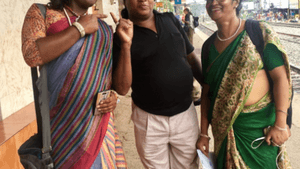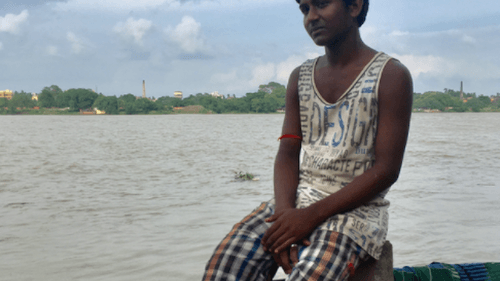Stay in the Loop
BSR publishes on a weekly schedule, with an email newsletter every Wednesday and Thursday morning. There’s no paywall, and subscribing is always free.
Out of Bengal's shadows
Penn's South Asia Center presents 'Until and Unless'

The powerful short documentary Until and Unless, screened this week at the University of Pennsylvania’s South Asia Center (SAC), examines the lives of LGBTQ+ individuals in South Asia’s Bengal region. Trying to preserve their identities, the Bengali queer community faces longstanding anti-sodomy laws, persecution, and prejudice.
The film follows four people. Through their voices and the imagery of their day-to-day lives, we feel their strength and dignity as they discuss the immense opposition and violent trauma they have experienced. The documentary paints a moving portrait of LGBTQ+ life in Bengal — the umbrella term there is LGBTKH (lesbian, gay, bisexual, transgender, kothi, and hijra) — and leaves the viewer feeling both disturbed and moved.
Beauty and brutality
Its subjects are Sintu, a trans woman and community leader raised in the Sheoraphuli red-light district; Nitu, a trans woman sex worker who lives a dual identity as a man named Nitai; Lovely, a Kothi person who remains closeted while working in an office; and Pratap, a trans teen still navigating her identity. As they speak about their lives, the viewer sees not just how difficult and often violent these people’s existence is but also the strength of their will to survive and assert their true identities.
Nitai explains he had a lot of problems as a child because he wore his hair long. His peers and the adults around him tormented him until he could no longer go out into the neighborhood. We see Nitai both in the male clothing he wears at home and the ornate saris Nitu wears while working. Nitu says she feels freer to express herself when arrayed in women’s finery. We see her both ways, and the transformation in her personality is notable when she wears her sari. She becomes more open and charismatic, not only admirable but likable as well.
Lovely is a closeted gay man who speaks in shadow to protect his identity. Because of the prejudice in Bengal, Lovely says he has to “love alone” and that the torment to which other people regularly subject him affects his mind. During a particularly disturbing part of the film, Lovely describes how a gang of boys brutally raped him with a bottle and castrated another gay boy who died on the street. I walked away from the film unable to shake this violence from my mind.

In another powerful scene, Sintu describes how she had never worn a sari in public, though it was one of her life’s goals. Simultaneously, we watch her carefully step out in public in a lavish peach-colored sari, gently lifting its side as she steps over puddles.
Leading by example
Pratap, the trans teen, looks up to Sintu, having always felt she, too, was a girl. She describes how her own father used to torture her because of this fact — one of many of the documentary’s poignant moments.
The film’s imagery of this West Bengali neighborhood and the stories of these mighty individuals who inhabit it leave a lasting impression. Coincidentally, the film is set one year before India’s groundbreaking decision to repeal its anti-sodomy law. But at a panel after the film — featuring both Sintu and Nitu from the documentary and Dr. Soma Roy, advisor to the transgender collective Anandam and senior research and capacity building officer at Sonagachi Research and Training Institute — all agreed that the law’s repeal is only the beginning of the fight for LGBTKH rights in India.
The South Asia Center at the University of Pennsylvania invited these three to Philadelphia to take part in the SAC Artist Residency Program. The documentary was made through a collaboration between the SAC Research Internship Program and the grassroots Bengali LGBTKH organization Balaram Dey Street Anandam. It is being shown at universities on the East Coast and in California.
What, When, Where
Until and Unless. Created by Balaram Dey Street Anandam; directed by Sintu Bagui, Netu Giri, Soma Roy, and Amelia Carter. November 13, 2018, at the University of Pennsylvania's South Asia Center, 3701 Chestnut Street, Philadelphia. 215-898-4490 or southasiacenter.upenn.edu.
To learn more about this film, visit balaramanandam.org.
Sign up for our newsletter
All of the week's new articles, all in one place. Sign up for the free weekly BSR newsletters, and don't miss a conversation.
 Courtenay Harris Bond
Courtenay Harris Bond